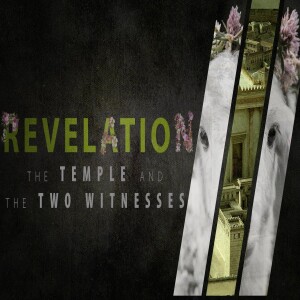
Saturday Oct 30, 2021
Revelation - The Temple and the Two Witnesses
Revelation - The Temple and the Two Witnesses

In this Bible teaching from Founded in Truth Fellowship, Matthew Vander Els guides us through a significant passage in the book of Revelation, specifically chapter 11, focusing on the symbolism of the temple and the two witnesses. He emphasizes that Revelation, while containing visions of the future, was also written to encourage first-century believers facing intense persecution and remains relevant for Christians today. The letter uses a genre called apocalyptic literature, which employs symbolic language to reveal the spiritual realities behind earthly events, assuring believers that even in the midst of suffering, Jesus (Yeshua) is still in control.
Vander Els begins by addressing the common human desire for community and a foundation in truth and love, which Founded in Truth Fellowship aims to provide. He highlights the core identity of their community as Bible-loving, Sabbath-celebrating, Hebraic-emphasizing, and diverse, with a central focus on Jesus, whom they call Yeshua. The teaching then delves into the book of Revelation, noting its intention not to merely shock but to inspire and edify. It's described as a theopolitical letter of resistance, exposing the true nature of the world and the empires of the earth, while affirming God's sovereignty.
A key point emphasized is that the original audience of Revelation faced severe hardships: their land being taken, homes stripped away, and loved ones exiled or killed for their faith. The purpose of the letter was to encourage them to understand that these trials were happening for the glory of King Yeshua and to bear witness to His kingdom through their actions and words, sustained by the hope of a safe place with God. Vander Els then poses the question of how believers today should live in light of this hope, suggesting it involves showing others this hope through a life characterized by grace, forgiveness, and endurance, mirroring the character of Christ.
The teaching then focuses on Revelation 11:1-2, where John is instructed to measure the temple of God, the altar, and those who worship there, but to exclude the outer court, which is given to the Gentiles to be trampled for 42 months. Vander Els discusses two main interpretations of this passage. The more popular, often found in dispensational circles and popularized by works like the "Left Behind" series, views this as a future literal temple to be built in Jerusalem before Jesus returns, with the measuring representing God's protection of ethnic Jews worshiping there while Gentiles outside are not protected. However, Vander Els presents an alternative, more symbolic interpretation, suggesting that the temple represents God's spiritual presence protecting believers in every generation, from the time of Jesus' resurrection until his return.
To support this symbolic view, Vander Els examines how the New Testament speaks of the temple. He notes that Jesus himself referred to his body as the temple that would be destroyed and rebuilt in three days. Paul also frequently described believers as the temple of God where the Spirit dwells. Examining the use of the Greek word "naos" for temple in Revelation, Vander Els points out that outside of Revelation 11, it consistently refers to God's spiritual temple, believers, or Jesus. He cites Hebrews, which describes the earthly temple as a figurative representation of the true, heavenly temple. Furthermore, Revelation 21-22 describes the New Jerusalem as not having a physical temple because the Lord God Almighty and the Lamb are its temple. Jesus' promise to the church in Philadelphia, to make the one who conquers a pillar in the temple of God, further supports the idea of believers being part of this spiritual temple.
For more Bible Teachings, click the link.
Application for Everyday Life:
- Embrace your identity as part of God's spiritual temple: Understand that as a believer, you are a dwelling place for God's Spirit and part of a holy community.
- Bear witness to Jesus Christ in the face of hostility: Recognize that true witness often occurs during difficult times and that your response should reflect the hope you have in Christ.
- Live a life characterized by grace, forgiveness, and endurance: Mirror the character of Christ in your daily interactions, showing the world a different way to live.
- Find spiritual protection in your relationship with God: Trust that God is with you and will strengthen you through any suffering or uncertainty you face.
- Use the word of God as your primary weapon: Engage with Scripture and let it guide your words and actions, recognizing its power to bring truth and challenge.
- Focus on what you are for (Christ is King) rather than solely on what you are against: Form your identity in the unshakable truth of Christ's reign.
- Be a temple builder by making disciples: Actively participate in growing God's community by sharing your faith and teaching others.
- Release fear and anxiety, trusting in God's sovereignty: Remember that God is in control, even when circumstances seem overwhelming.
- Draw strength and encouragement from the hope of eternal life: Keep an eternal perspective, knowing that earthly suffering is temporary.
References:
- Revelation 2:10
- Daniel 1:12
- Daniel 1:14
- Acts 2
- John 2:19-21
- 1 Corinthians 3
- 1 Corinthians 6
- 2 Corinthians 6:16
- Hebrews 8:1
- Revelation 22
Books and Resources Mentioned:
- The Bible
- Left Behind series by Tim LaHaye and Jerry B. Jenkins
- The Climax of Prophecy: Interpretations of the Book of Revelation by Richard Bauckham
Note: This article contains affiliate links.
No comments yet. Be the first to say something!